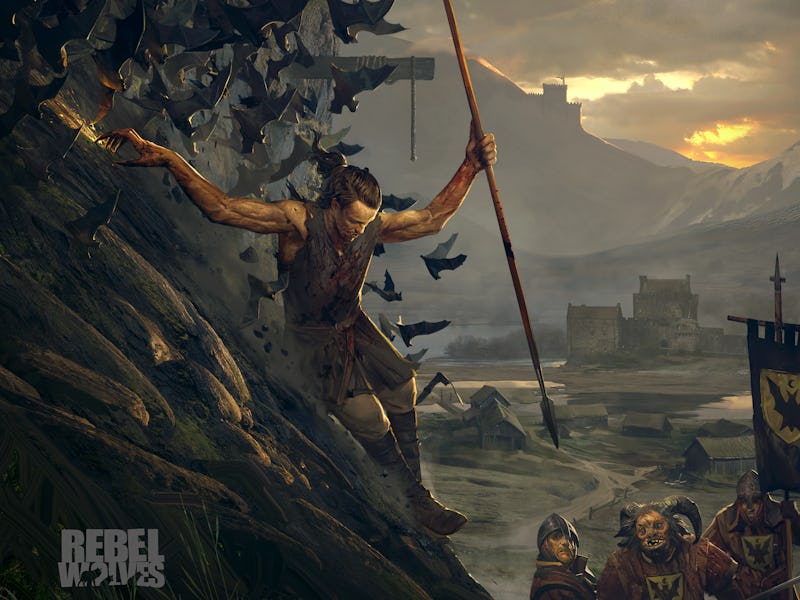Rebel Wolves’ New Creative Director Talks AI, RPGs, and Angry Witcher Fans
Mateusz Tomaszkiewicz looks forward to the first project from this team of former The Witcher developers.

The Witcher 3 is a genre-defining game, the kind of project that any developer could be proud to work on. But as its lead quest designer, Mateusz Tomaszkiewicz, says, creating a game in such a beloved series also has its drawbacks.
“People will say, ‘Oh, this is not the real Witcher, real Geralt would never do this,’” Tomaszkiewicz tells Inverse.
Tomaszkiewicz worked at CD Projekt Red on titles including Cyberpunk 2077 and Gwent before heading to Riot Games as the principal narrative designer of its upcoming League of Legends MMORPG. Now, he’s joining upstart Polish studio Rebel Wolves as its new creative director to lead a team of fellow CDPR veterans. (The company also received funding from Chinese gaming company Netease, among other investors.)
While the company, which was founded in 2022, is still tight-lipped on its first project, Tomaszkiewicz teases that the upcoming “story-driven dark fantasy role-playing adventure,” which isn’t based on an existing IP, will push storytelling and greater player freedom to new heights.
Inverse spoke to Rebel Wolves’ new creative director about the studio’s future plans, how to avoid the turmoil that’s led to layoffs across much of the industry, his thoughts on using AI in game development, and more.
Meet Mateusz Tomaszkiewicz
CDPR veteran Mateusz Tomaszkiewicz speaks to Inverse.
Tomaszkiewicz spent nearly 13 years at CD Projekt, where he worked as The Witcher 3’s lead quest designer, Cyberpunk 2077’s quest director, and director of Gwent and its spinoff Thronebreaker. He moved to Riot Games in 2021, accepting a position as principal narrative designer on the upcoming MMORPG based on League of Legends.
“At Riot, I saw a lot of interesting ways they look at designing gameplay and how dedicated they are to creating an excellent user experience,” Tomaszkiewicz says. “I found it very inspiring. I would like to bring some of that with me.”
Rebel Wolves’ new creative director has a deep love of RPGs that he plans to take with him to game design.
“I played Baldur’s Gate 3 three times and I’m having another playthrough with a friend,” he says, adding that he’s played a druid, a drow sorcerer, and a bard on separate instances.
In RPGs and elsewhere, Tomaszkiewicz says he looks for an open-ended narrative above all else.
“You don’t want to put players on a restrictive story that will not give them any wiggle room,” Tomaszkiewicz says.
On the subject of Baldur’s Gate 3’s source material, Dungeons & Dragons, Tomaszkiewicz says, “When I was younger I was a Dungeon Master a lot. There are a lot of similarities to game design because when you’re a DM, you have to prepare a story in a way that leaves space for players to experiment, make decisions, and just have fun. You want to put challenges in the player’s path so they can play around with the game mechanics.”
A Rough Year for Game Developers
Among roles on The Witcher 3 and Cyberpunk 2077, Mateusz Tomaszkiewicz was the director of Gwent and its narrative spinoff Thronebreaker: The Witcher Tales.
Tomaszkiewicz acknowledges that it’s been a rough year for the games industry, but is optimistic about the future of Rebel Wolves.
“There were lots of great games last year, but it was very difficult for developers. So many people lost their jobs, including some of my friends.”
“We’re being very mindful of scope and team size,” he says. “We don’t want to over-hire just to solve a problem in the here and now without thinking about whether we have jobs for them on a longer timeframe. That’s not the best way for them or us.”
When Rebel Wolves officially announced its formation, it said part of its mission was “putting the team first — always.” Tomaszkiewicz has a lot to say on how the studio can accomplish that, much of which he said he learned from his team at Riot.
“We had rituals when we hit a milestone where the team would all say what was working and what wasn’t, and make sure to openly praise each other. That worked well for morale.”
AI and Video Games
Tomaszkiewicz’s thoughts are also clear on another controversial games industry trend — AI.
“I do like it as a tool to make certain mundane tasks easier,” he says. “I don’t like it as a content creator.”
Tomaszkiewicz points to AI tools like grammar checkers that he uses in his own work, or using AI-generated voices or art for reference in pre-production. But he’s adamant that the products of AI shouldn’t make their way into a finished game.
“I have ethical concerns with things like voice generation,” he says. “But ethical concerns aside, it’s not as good as real actors acting. Let’s keep the creative part on developers, just make their life easier by streamlining some of the more mundane tasks.”
What’s Next for Rebel Wolves?
Rebel Wolves was formed in 2022 by a group of former CD Projekt developers.
Rebel Wolves isn’t ready to share anything about its upcoming game yet, including its name, gameplay, or whether having the director of Gwent onboard means the dark fantasy will include an equally excellent card game.
“We want to focus a lot on player freedom and interactivity in the story,” he says. “I would like to push it a little bit further than we did before. There are some systems that will be very interesting for players to play around with, but I can’t talk about them yet.”
“For now, I can only say this is something I haven’t seen on the market in recent years that I can’t wait to play.”